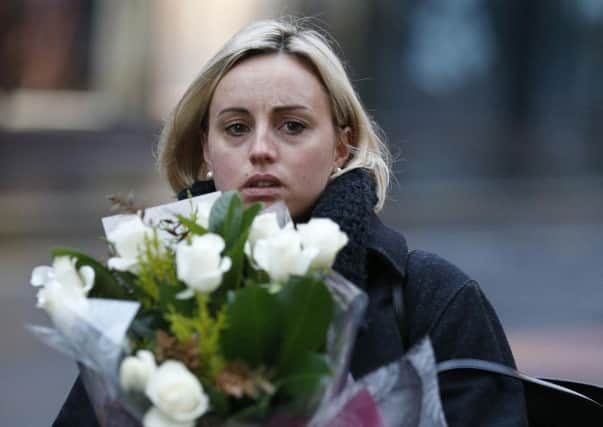Michael Tierney: First shaky step after tragedy


It is difficult to accept the deaths of six innocent people as you walk around George Square and its adjacent streets, perhaps even walking in the ghostly footsteps of the dead. There is a palpable sense of desperate loss and hurt. The square is surrounded and illuminated by ten angels sparkling atop tall steel columns. I count them again hoping for a sign, one for each tragic soul perhaps. But life is never so easily broken into signs and symbols.
CONNECT WITH THE SCOTSMAN
• Subscribe to our daily newsletter (requires registration) and get the latest news, sport and business headlines delivered to your inbox every morning
Advertisement
Hide AdAdvertisement
Hide AdUntil you see the deep trail of bunched flowers beside the Millennium hotel and alongside the Gallery of Modern Art, and the votive candles and handwritten cards from strangers, and the row of six small Santas, you might think that there had been no tragedy at all.
Yet, in a civic square that was always so frantic and busy, people walk a little slower and talk a little more quietly. Some offer a consoling hug to another, a squeeze of the arm. A silent prayer. There are few wary eyes tonight in this bustling city centre. Instead people are brought together by the death of strangers. A few point towards the Duke of Wellington statue, while trying to work out the trajectory of the lorry that crashed so fatefully into the hotel, taking with it six innocent lives.
They wonder, we all do, about chance and fortune. And doors opening and others closing and how the fates decide. But Glasgow has never faced anything it could not endure.
The voices of children are the first sign of change I hear. It’s always a good sign. No matter what the tragedy, the innocent voice of a child will signal it is time to move. Time to go forward. Time to take the next step. Their shrieking voices scream in the ice rink and on the big wheel that stands like a sentinel over the square, dwarfing the dark statues of Walter Scott and Robert Peel and others. In truth, I preferred the old days when carols and the manger took precedent but I’d happily settle now for the voices of these children in such tragic times.
A little girl dances to a Kylie Minogue song blaring from a speaker. Then her mother sings along to another by Ronan Keating. “Life is a rollercoaster you just have to ride it…”
I watch from a distance as groups of people pay their respects. They read cards filled with tiny, personal details and shed the briefest of tears. It is early evening and the square is already dark. With public deaths of this nature, people are less likely to be strangers to each other. With public deaths people rarely forsake the opportunity to open up to each other, however briefly.
I smile when I see a young couple kissing in the shadow of Queen Street Station, where the out-of-control bin lorry finally stopped. I close my eyes. I’m transported to 20 years earlier. We all are. Nothing really changes here. Everything moves so quickly. From mourning and sadness to love and laughter. It’s as it should be.
The square is bright with illuminated electric bells and swinging, garlanded holly. The manger is lit up. Mary, Joseph and the baby Jesus gaze out at the finest Victorian civic masterpiece that has ever been gifted to this incredible city.
Advertisement
Hide AdAdvertisement
Hide AdMeanwhile, the hand of time moves inexorably towards the end of another day and towards another year. If we are honest with each other, in time most of us will forget. The families of the dead, of course, will never forget. They have parted from people they love, and that parting was without goodbye and no real answer as to why.
If they can take any comfort it might be an acceptance that there simply is no control over our lives and that we are as ephemeral as the flowers laid out against a wall by strangers. And that life is as transient and movable as fairground attractions that spin with laughing children.
We do not know enough about Jack, Lorraine and Erin. Nor Gillian, Jacqueline and Stephenie. But what we do know about them is that they mattered. We know that their lives meant something. And for their families they always will.
I used to go to George Square annually with my family when I was a child – a joyous place with low-slung walls and islands of grass and wooden-backed benches. Every generation has its story to tell. The story will be a different one now.
I walked once more around the square. There again was the manger, that small symbol of something that goes beyond both our knowing and our understanding. People pause by it just to think and wonder, others to pray. The acceptance or rejection of certainties. Some neither pray nor wonder. But, in times like these, the cracks and crevices that strangers usually keep to themselves open up. We talk to each other. We whisper and console. Share a story. A tale. A conversation. Share a part of ourselves with each other. Death does that. It causes us to pause and reflect. Or at least it should do.
Maybe there really are signs if we look closely enough. Maybe they’re just not as obvious as we think. I searched for my signs in the white winged illuminations in the darkness and beyond. But maybe it’s not the ten angels who safeguard George Square after all. Maybe it’s the six dear souls who have departed it.
SCOTSMAN TABLET AND IPHONE APPS